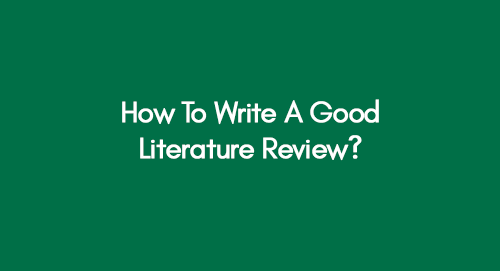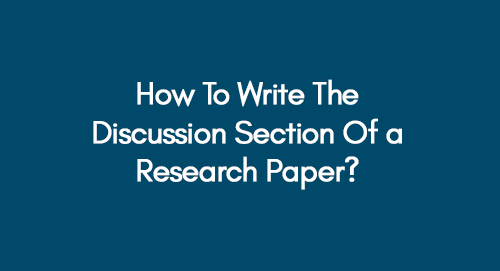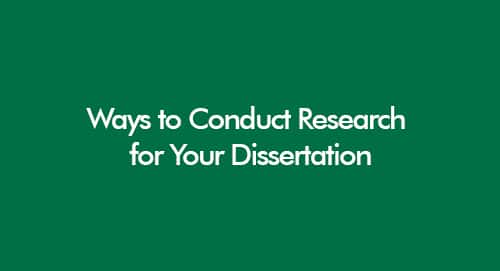
How to Write a Good Literature Review: Smart Ways to Succeed in Research Writing
October 27, 2022
How to Write an Abstract for a Dissertation? | A Comprehensive Guide on Abstract
October 27, 2022When you are assigned a research paper, one of the most important parts of the assignment is the discussion section. This section is where you explain how your data supports or contradicts your hypotheses.
Learn in Detail About Writing Hypotheses in Research
To write an effective discussion, you must know how to analyze and present your data clearly and concisely. This article will discuss expert tips for writing a strong discussion section in your research paper. Learn the essential steps to write a strong discussion section in your research paper with our concise guide on 'How to Write the Discussion Section of a Research Paper.
What Should be Included in Your Discussion Section?
The discussion of a research paper is a section where you interpret the data collected during your research. It is important to present your findings clearly and concisely, governed by 4 keywords; description, interpretation, evaluation and implications.
The discussion section should include the following:
- A description of the findings
- An interpretation of the findings of other studies
- An evaluation of the findings
- The implications of the results/findings for future research or practice.
The Description of Findings
The first step in writing the discussion section is to describe the findings. It includes both quantitative and qualitative data. The description should be clear and concise. It should not include any interpretation or evaluation of the data. This is simply a presentation of what was found during the research.
The Interpretation of Findings
The interpretation of findings is where you will discuss what the data means in relation to other studies conducted on the same topic. That is where you will start to conclude your research. Remember to back up your interpretation with evidence from your data.
The Evaluation of Findings
In the evaluation step, you will assess whether the research met its objectives. This includes determining if there are any limitations to the study and how they may have affected the results. It is also important to discuss any unexpected findings and how they relate to the research objectives.
Implications for Future Research or Practice
Finally, it is important to discuss the implications of the findings for future research or practice. This includes stating any recommendations for further research that may be necessary and discussing how the results can be applied in a real-world setting. Remember to back up any recommendations with evidence from your data.
Tips on How to Write Discussion in Research Paper
1. Start with a Strong Opening Statement
Your opening statement should be clear and concise, and it should state the main argument of your paper. This statement should be supported by evidence from your research.
2. Introduce Your Topic
Before discussing your main points, you should briefly introduce your topic and provide some background information. This will help your readers to understand the context of your paper better.
3. Develop Your Argument
Every paragraph in your paper should focus on one main point that supports your overall argument. Make sure to back up each point with evidence from your research.
4. Address CounterArguments
To make your argument more convincing, you should anticipate and address counterarguments that could be made against it. This will show that you have considered all sides of the issue and are confident in your position.
5. Use Strong Transitions
Transitions are important in discussion papers because they help to connect your ideas and create a logical flow. Be sure to use transitions both between and within paragraphs.
6. Conclude with a Strong Statement
Your conclusion should restate the main argument of your paper and leave your readers with something to think about. A stellar conclusion will leave a lasting impression on your readers and will make them more likely to remember your paper.
7. Edit and Proofread Your Paper Carefully
Before submitting your paper, edit and proofread it carefully for grammar, spelling, and punctuation errors.
How does a Discussion Section Vary from a Conclusion?
In many ways, a discussion section is similar to a conclusion. Both are typically found at the end of the piece, and both provide a summary of the main points that have been presented. However, there are also some important distinctions between a discussion section and a conclusion.
Perhaps most importantly, a discussion section is typically much longer than a conclusion. Whereas a conclusion may be just a few sentences long, a discussion section may be several paragraphs or even pages in length.
In addition, whereas a conclusion will simply restate the main points that have been made, a discussion will provide further analysis and interpretation of key findings.
It is often seen as being more intellectually demanding than a conclusion.
Finally, whereas a conclusion will typically focus on what has been learned from the main body of the text, a discussion section will typically focus on future research directions or potential implications. For all these reasons, it is essential to understand the difference between a discussion section and a conclusion before writing either one.
- A discussion section is typically found in scientific papers.
- The purpose of a discussion section is to interpret and draw conclusions from the data presented in the paper.
- A discussion section should be objective and unbiased.
- A conclusion is typically found in papers that are not scientific in nature.
- The primary purpose of a conclusion is to summarize the paper's main points.
- A conclusion should be objective and unbiased.
- A discussion section is usually longer than a conclusion.
- A discussion section typically contains more detailed information than a conclusion.
- A discussion section often includes conflicting interpretations of the data presented in the paper.
- A conclusion typically contains a single interpretation of the data presented in the paper.
Common Mistakes to Avoid in a Discussion
1. Restating Your Results
One mistake often made in a discussion section is simply restating the study's results. While it is important to mention your results briefly, the discussion section should be focused on interpretation and implications, not just a regurgitation of data. Instead of just repeating what you found, discuss why you found it and what it means in relation to previous research.
2. Making Over-Generalizations
Another mistake to avoid is making over-generalizations about your findings. Just because you found something true in your study does not mean it is universally true. Be cautious about extrapolating too much from your data and making claims that are not supported by the evidence.
3. Failing to Critique Your Own Study
A discussion section is also an opportunity to reflect on the shortcomings of your study and suggest ways that future research could be improved. Don't be afraid to point out any limitations of your study or areas where more research is needed. By acknowledging the weaknesses of your study, you can make your findings more valuable.
4. Failing to Summarize the Main Points of the Paper
Before you can engage in a meaningful discussion of the data, you must first provide a summary of the paper's main points. This will remind the reader of what they have just read and help them follow along with your discussion. Include a brief overview of the research question, hypothesis, methodology, results, and conclusion.
5. Repeating Information from Other Sections of the Paper
Once you have summarized the paper's main points, you can discuss the implications of your findings. However, it is important to avoid repeating information from other paper sections. For example, there is no need to reiterate your results or conclusions here. Instead, focus on providing new insights and interpretations based on your data analysis.
6. Making Assumptions about the Reader's Knowledge
When writing a discussion section, it is important to assume that your reader has not read the entire paper. As such, you will need to provide enough context to interpret the data without repeating information from other sections. Be sure to explain any jargon or terminology that may be unfamiliar to your reader.
7. Failing to Make Connections to Other Areas of Study
An effective discussion section will go beyond simply summarizing your findings and will make connections to other areas of study. For example, if you discuss the implications of your findings for future research, connect your work to the existing literature in the field. This will help situate your work within the larger conversation that is taking place in academia.
Conclusion
Writing a discussion section can be tough, but if you follow these simple steps, you can write an effective discussion section that engages your reader and presents your findings clearly and concisely.
Get 3+ Free Dissertation Topics within 24 hours?



























